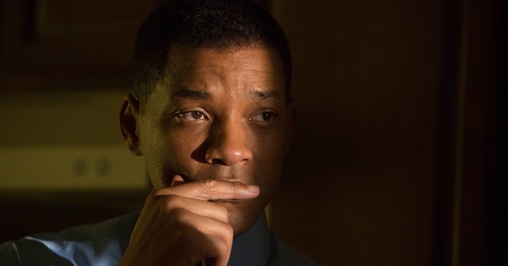The structure of whistleblower-against-organization is a fine way to tell this story, but Landesman leans too far into it. A month before Concussion's release, Spotlight tackled a similar structure, but there weren't any suspicious cars in the rearview window; just institutional resistance. That more adult approach is scrapped in Concussion, which does indeed feature panicked drives with black SUV's close behind. Maybe the true story of Dr. Omalu just didn't have enough drama in it, because the attempts to punch it up never pass the smell test. Arguments against Omalu aren't made on scientific merit, but rely on the pride of place the NFL occupies in America, and especially in Pittsburgh, where characters intone about gleaming stadiums as the new cathedrals. There's never any question that Omalu's arrived at the right conclusion, and with current knowledge, the stakes in the film are reduced to when the flimsy wall of intransigent officials is going to crumble. A different approach might've examined the thrill of scientific or medical discovery, but Concussion is too wrapped up in its narrow narrative to allow any time for that.
The discussion of science and medicine in Concussion, while mostly cast aside, is also a source of frustration common to films that about those topics. The writer, also Landesman in this case, has to bridge the gap between the conveyance of competence and the need for medical jargon and exposition. Contagion is a film that expertly walked this line. Concussion does not. In a scene that is supposed to be the triumphant end of the first act, in which CTE is given a name, Omalu explains his thesis to other doctors, neurologists even, as if they're in middle school. It feels utterly false. The workplace aspect of the morgue never thrills as it should, either. It's a place where the stories of peoples' deaths are told in their bodies, where doctors act as detectives, but in Concussion, it's a place where a doctor can earnestly say to a nurse, "There are no coincidences," a notion I would imagine a doctor is disabused of while still in medical school. I've seen the real Omalu in interviews, and his enthusiasm for science is apparent. Landesman and Smith are unable to convey that key attribute.
The frustrating script is made more so by the strong cast that Landesman assembled. Smith is in a humorless mode, and lacking in the easy charm that has made him a superstar. Otherwise excellent actors are reduced to set dressing by the bland lines they have to recite. Alec Baldwin, Albert Brooks, and Gugu Mbatha-Raw function as characters in Omalu's corner, and none make much of an impact, especially Mbatha-Raw as Omalu's significant other. The couple shares no chemistry, and she is completely wasted as a source of hackneyed support. Concussion also has the problem of a deep call sheet that features recognizable faces like Paul Reiser, Stephen Moyer, and Eddie Marsan, but not enough material for these actors. They get a couple minutes of screentime, and are never seen again. The actors, like Morse, who play the former athletes in the throes of late-stage CTE, lend the most urgency to the film. Landesman is most successful here, ably conveying the confusion and fear of wives and children as these giant men stalk around their homes, enraged both by their disease and by no one's ability to help them. These tragic sequences inject needed life into Concussion.
Concussion is simply boring, a mortal sin for a film. Attempts to spice it up mostly fall flat. A treasured institution covering up negative information about its product is ripe for drama, as is a scientist discovering something inconvenient for millions of people. Concussion squanders that potential. Watch Steve James' documentary about the subject, Head Games, instead. No tense and false car chases in that one, and far more interesting.

 RSS Feed
RSS Feed